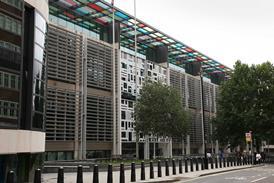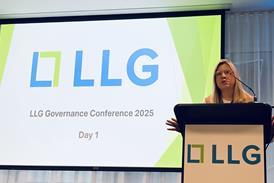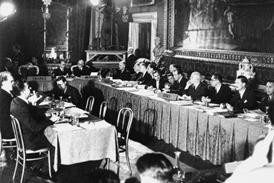Decisions filed recently with the Law Society (which may be subject to appeal)
Mladen Kesar and Elizabeth Hill
Application 12328-2022
Hearing 12-13 September 2022
Reasons 2 November 2022
The SDT ordered that the first respondent (admitted 2005) should pay a fine of £6,000, and further that he might not be a head of legal practice/compliance officer for legal practice or a head of finance and administration/compliance officer for finance and administration, with liberty to apply to vary that condition.
The SDT ordered that the second respondent should pay a fine of £6,000.
Between 2013 and 2019 the first respondent (while manager and owner of Kesar & Co Ltd) and the second respondent (who was not a solicitor and while employed by the firm as practice manager and acting as COFA) had:
- failed either to pay professional disbursements or to transfer payments received to meet those professional disbursements into a client account within the requisite time frame, in breach of rules 1.2, 6.1 and 19 of the Solicitors Accounts Rules 2011, and principles 6, 8 and 10 of the SRA Principles 2011;
- misused money they had received from the Legal Aid Agency for professional disbursements, in breach of rules 1.2, 6.1 and 19 of the rules, and principles 6, 8 and 10;
- failed to ensure that account records were kept in compliance with the Solicitors Accounts Rules 2011, in breach of rules 1.2(f), 6.1 and 29.1, 29.2, 29.4 and 29.9 thereof, and of principles 8 and 10; and
- failed promptly to notify the SRA that the firm was in serious financial difficulty, thereby failing to achieve outcomes 7.4 and 10.3 of the SRA Code of Conduct 2011 and breaching principle 7 of the SRA Principles 2011.
The second respondent had thereby been guilty of conduct of such a nature that, in the opinion of the SRA, it would be undesirable for her to be involved in a legal practice.
Neither respondent had deliberately sought to mislead. Their failures had been born out of ignorance, as opposed to sinister motives. They had acted from a position of ignorance, but repeatedly so and over a protracted period of time.
The SDT acknowledged the strenuous efforts made by the respondents to make good their failures, and noted that all debts had been satisfied by September 2021.
The first respondent was ordered to pay costs of £35,950. The second respondent was ordered to pay costs of £17,975.
Richard Charles Boyd
Application 12338-2022
Admitted 1980
Hearing 28 September– 3 October 2022
Reasons 7 November 2022
The SDT ordered that the respondent be struck off the roll.
While in practice as a partner in North Yorkshire Law, the respondent had made or authorised transfers of up to £37,677.60 from the firm’s client account to the office account that were improper, without prior written notifications of the costs incurred or a copy of the bills of costs being given to the client or paying party. In doing so, he had breached any or all of: (a) rules 4.3 and 6.1 of the SRA Accounts Rules 2019; (b) principles 2, 4, 5 and 7 of the SRA Principles 2019.
He had stated to Mrs M, his executor client on the file of client B, that ‘it is perfectly normal to raise a bill and take costs and then discuss with the client...’ when he did not believe that to be the case, thereby breaching principles 2, 4 and 5.
He had failed to disclose material information to insurers, namely that he had been advised by the SRA that he was not authorised to practise by them, which was material to risk and which he knew, or should have known was so material, thereby breaching principles 2, 4 and 5.
He had made a series of three statements to his insurers and brokers concerning his correspondence with the SRA in relation to the issue of his authorisation to practise which were either untruthful or apt to mislead them as to the true position, thereby breaching principles 2, 4 and 5.
There was an inherent risk of significant harm in making improper transfers out of client account. That was exacerbated when the firm was on such a precarious financial footing. The SDT recognised that the transfers had been reversed, but not for almost a year, during which time the monies were unprotected.
The estate representatives had been caused significant distress and the consequent harm to the reputation of the profession was serious, and aggravated by the fact that it had been deliberate, calculated and repeated.
The misconduct was mitigated to some extent by the fact that the monies were eventually returned to the client account. The respondent had been unable to resolve the insurance position however.
The tribunal considered whether the circumstances in this case were exceptional, having regard to Solicitors Regulation Authority v James [2018] EWHC 3058 (Admin). The character references were glowing, but that in itself could not amount to an exceptional circumstance.
The only appropriate sanction was a strike-off. The SDT made no order as to costs.
Matthew Conway Ledvina
Application 12335-2022
Admitted 2007
Hearing 26 September 2022
Reasons 9 November 2022
The SDT ordered that the respondent be struck off the roll.
While in practice as a partner in North Yorkshire Law, the respondent had made or authorised transfers of up to £37,677.60 from the firm’s client account to the office account that were improper, without prior written notifications of the costs incurred or a copy of the bills of costs being given to the client or paying party. In doing so, he had breached any or all of: (a) rules 4.3 and 6.1 of the SRA Accounts Rules 2019; (b) principles 2, 4, 5 and 7 of the SRA Principles 2019.
He had stated to Mrs M, his executor client on the file of client B, that ‘it is perfectly normal to raise a bill and take costs and then discuss with the client...’ when he did not believe that to be the case, thereby breaching principles 2, 4 and 5.
He had failed to disclose material information to insurers, namely that he had been advised by the SRA that he was not authorised to practise by them, which was material to risk and which he knew, or should have known was so material, thereby breaching principles 2, 4 and 5.
He had made a series of three statements to his insurers and brokers concerning his correspondence with the SRA in relation to the issue of his authorisation to practise which were either untruthful or apt to mislead them as to the true position, thereby breaching principles 2, 4 and 5.
There was an inherent risk of significant harm in making improper transfers out of client account. That was exacerbated when the firm was on such a precarious financial footing. The SDT recognised that the transfers had been reversed, but not for almost a year, during which time the monies were unprotected.
The estate representatives had been caused significant distress and the consequent harm to the reputation of the profession was serious, and aggravated by the fact that it had been deliberate, calculated and repeated.
The misconduct was mitigated to some extent by the fact that the monies were eventually returned to the client account. The respondent had been unable to resolve the insurance position however.
The tribunal considered whether the circumstances in this case were exceptional, having regard to Solicitors Regulation Authority v James [2018] EWHC 3058 (Admin). The character references were glowing, but that in itself could not amount to an exceptional circumstance.
The only appropriate sanction was a strike-off. The SDT made no order as to costs.
Matthew Conway Ledvina
Application 12335-2022
Admitted 2007
Hearing 26 September 2022
Reasons 9 November 2022
The SDT ordered that the respondent should be struck off the roll.
Having been admitted as a solicitor of the senior courts, the respondent had conspired with others to commit securities fraud in the United States and, in doing so, had failed to achieve outcome 11.1 under the SRA Code of Conduct 2011, and had breached principles 2 and 6 of the SRA Principles 2011, and principles 2 and 6 of the SRA Overseas Principles 2013. He had acted dishonestly.
The respondent had, by his own plea, been convicted of a serious offence, namely conspiracy to commit securities fraud.
Serious harm had been caused to individual investors who had lost substantial sums of money having been led to believe that they were involving themselves in an honest scheme. The potential harm to others had also been apparent.
The damage to the reputation of the profession had therefore been very high as this had the potential to discredit the profession both internationally and domestically.
The respondent had been found to have been dishonest, which was an aggravating factor.
The SDT did not consider that there were exceptional circumstances present in the respondent’s case such that a lesser sanction than strike-off was warranted. The protection of the public and public confidence in the profession and the reputation of the profession required no lesser sanction than that the respondent’s name be removed from the roll.
The respondent was ordered to pay costs of £3,675.
George Edward Nosworthy
Application 12356-2022
Admitted 1965
Hearing 4 November 2022
Reasons 9 November 2022
The SDT ordered that the respondent should be struck off the roll.
While in practice as a solicitor and principal at Cree Godfrey & Wood, (i) in respect of the administration of the estate of person IY (deceased), he had overcharged the estate; (ii) in respect of the administration of the estate of person MK (deceased), he had overcharged the estate; (iii) in respect of the administration of the trust of person SC (deceased), he had overcharged the trust; and (iv) in respect of the administration of the estate of person MR (deceased), he had overcharged the estate: thereby breaching (a) rules 1.02, 1.06 and 2.03 of the SRA Code of Conduct 2007, and rule 22 of the Solicitors Accounts Rules 1998; (b) principles 2 and 6 of the SRA Principles 2011, and rule 20.1 of the Solicitors Accounts Rules 2011; and (c) principles 2, 4 and 5 of the SRA Principles 2019, and rule 5.1 of the Solicitors Accounts Rules 2019. The respondent had acted dishonestly. On or after 25 November 2019, his dishonesty had breached principle 4 of the 2019 Principles.
The parties had invited the SDT to deal with the allegations against the respondent in accordance with a statement of agreed facts and outcome.
Given the serious nature of the respondent’s misconduct, including his admitted dishonesty, the only appropriate and proportionate sanction was to strike him off the roll. The SDT did not find any exceptional circumstances that would justify a sanction other than striking him off the roll.
The respondent was ordered to pay costs of £36,157.
Danielle Louise Shawcross
Application 12359-2022
Admitted 2013
Hearing 24 October 2022
Reasons 21 November 2022
The SDT ordered that the respondent should pay a fine of £5,000.
While in practice as a solicitor, owner, sole principal and COFA of DLS Legal Services Limited, the respondent had (i) by permitting a shortfall of £41,055.95 in the client account to exist as at 30 September 2018, breached rule 1.2(a) and (b) of the SRA Accounts Rules 2011, and principles 6 and 10 of the SRA Principles 2011; and (ii) by failing promptly to rectify that shortfall, breached rule 7.1 of the rules, and principles 6 and 10.
The respondent had (i) failed to keep proper accounting records; (ii) made incorrect client to office account transfers totalling £33,848.34; (iii) held client money totalling £3,044 incorrectly in the office account; and (iv) made incorrect payments from the client account totalling £4,163.61, thereby breaching rules 1.2, 14.1, 20.1 and 20.6 of the rules, and principles 6 and 10, and failing to achieve outcomes 7.2 and 7.4 of the SRA Code of Conduct 2011.
The respondent had failed to prepare adequate client account reconciliations, thereby breaching rules 1.2, 29.12 and 29.14 of the rules, and principles 6 and 10.
The parties had invited the SDT to deal with the allegations against the respondent in accordance with a statement of agreed facts and agreed outcome.
As a sole practitioner, the respondent was responsible for the state of the firm’s accounts. There had clearly been harm to the reputation of the legal profession but no harm or even inconvenience to clients. There were no aggravating factors. There were no allegations of dishonesty or lack of integrity and there had been no previous disciplinary matters before the SDT. The respondent asserted that she had made admissions, had cooperated with the SRA, had taken steps to rectify the issues identified including instructing external accountants to rewrite the books and had undergone training to fill the gaps in her own knowledge. She had shown insight into how the problems had arisen.
A fine of £5,000 would be appropriate.
The respondent was ordered to pay costs of £10,000.
Dominic Leon Macknight practising at Lawson Taylor Solicitors Ltd
On 1 December 2022, the panel resolved to intervene into Lawson Taylor Solicitors Ltd and into the practice of Dominic Leon Macknight at Lawson Taylor Solicitors Ltd, 314 Daisyfield Business Centre, Appleby Street, Blackburn BB1 3BL.
The grounds of intervention into Macknight’s practice were:
- There was reason to suspect dishonesty on the part of Macknight in connection with his practice at Lawson Taylor Solicitors Ltd – paragraph 1(1)(a)(i) of Schedule 1 to the Solicitors Act 1974 (as amended); and
- Macknight had failed to comply with the rules made under sections 31 and 32 of the Solicitors Act 1974 (as amended) – paragraph 1(1)(c) of Schedule 1 to the 1974 act (as amended).
The grounds of intervention into Lawson Taylor Solicitors Ltd were:
- There was reason to suspect dishonesty on the part of Macknight as a manager of the firm in connection with the firm’s business – paragraph 32(1)(d) of Schedule 2 to the Administration of Justice Act 1985 (as amended); and
- Macknight, as a manager of the firm, and the firm itself, have failed to comply with the rules applicable to them as a manager of the firm, and the firm itself by virtue of section 9 of the 1985 act (as amended) – paragraph 32(1)(a) of Schedule 2 of that act.
Sean Joyce of Stephensons Solicitors LLP, Wigan Investment Centre, Waterside Drive, Wigan, Greater Manchester WN3 5BA, tel: 0333 321 4409, email: interventions@stephensons.co.uk, has been appointed to act as the Society’s agent. The first date of attendance was 5 December.
Macknight’s current practising certificate has been suspended as a result of the intervention.






























